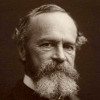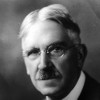“ Moral knowledge is thought to be a thing apart, and conscience is thought of as something radically different from consciousness. ”
John Dewey, Democracy and Education (1916). copy citation
| Author | John Dewey |
|---|---|
| Source | Democracy and Education |
| Topic | consciousness conscience |
| Date | 1916 |
| Language | English |
| Reference | |
| Note | |
| Weblink | http://www.gutenberg.org/files/852/852-h/852-h.htm |
Context
“On the other hand, the value of concrete, everyday intelligence is constantly underestimated, and even deliberately depreciated. Morals is often thought to be an affair with which ordinary knowledge has nothing to do. Moral knowledge is thought to be a thing apart, and conscience is thought of as something radically different from consciousness. This separation, if valid, is of especial significance for education. Moral education in school is practically hopeless when we set up the development of character as a supreme end, and at the same time treat the acquiring of knowledge and the development of understanding, which of necessity occupy the chief part of school time, as having nothing to do with character.”
source


